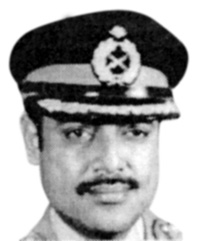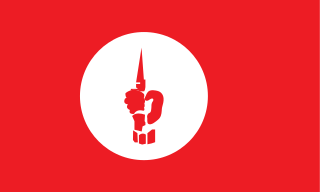Related Research Articles

The Bangladesh Armed Forces are the military forces of the People's Republic of Bangladesh. They consist of the three uniformed military services: the Bangladesh Army, the Bangladesh Navy and the Bangladesh Air Force. The Armed Forces are under the jurisdiction of Ministry of Defence of the Government of Bangladesh, and are directly administered by the Armed Forces Division of the Prime Minister's Office. The President of Bangladesh serves as the Commander-in-Chief of the Bangladesh Armed Forces. Bangladesh has the third-largest defence budget in South Asia and according to the Global Firepower index, The Bangladeshi military is the 37th strongest in the world and the third most powerful military force in South Asia. Border Guard Bangladesh and Bangladesh Coast Guard are under the jurisdiction of the Ministry of Home Affairs during peacetime, but during wartime they fall under the command of Bangladesh Army and Bangladesh Navy respectively.

Mahbubul Haque Khan, known as Azam Khan, was a Bangladeshi singer-songwriter, record producer, and lead singer for the pop-rock band Uccharon. He was also a freedom fighter who took part in the Liberation War of Bangladesh in 1971. He is considered to be one of the greatest artists in the history of Bangladeshi folk music and a founding figure of Bangla rock.
Muhammad Ataul Gani Osmani, was a Bengali military leader. Osmani's career spanned five decades, beginning with service in the British Indian Army in 1939. He fought in the Burma Campaign during World War II. After the partition of India in 1947, he joined the Pakistan Army and served in the East Bengal Regiment, retiring as a colonel in 1967. Osmani joined the Provisional Government of Bangladesh in 1971 as the commander-in-chief of the nascent Bangladesh Forces. Regarded as the founder of the Bangladesh Armed Forces, Osmani retired as a four-star general from the Bangladesh Army in 1972.

Khaled Mosharraf, Bir Uttom was a Bangladeshi army officer who is known for his role in the Bangladesh Liberation War and the subsequent coups in post-independence Bangladesh. After deposing Khondakar Mustaq Ahmad in the 3 November 1975 coup, Mosharraf was assassinated on 7 November 1975.

Armed Forces Day is observed in Bangladesh on 21 November. This signifies the day in 1971, when the members of the Bangladesh army, navy and air force were officially united and launched joint operations against the Pakistan occupation forces. On 16 December 1971, the Pakistani Army of 93,000 surrendered to the allied force of Bangladesh army, ending the Liberation War of Bangladesh.

Operation Jackpot was a codename for three operations undertaken by the Bengali Mukti Bahini in former East Pakistan against the Federation of Pakistan at the climax of the Bangladesh Liberation War.
Shafaat Jamil, Bir Bikrom was a Bangladesh Army colonel. He was the commanding officer of the 3rd East Bengal Regiment of Z Force Brigade in Sector 11 of Bangladesh Forces during the War of Bangladesh Independence in 1971. He was among the first Bengali officers who rebelled against the Pakistani Army in the 1971 Liberation War of Bangladesh and later fought in 11 sector and in Sylhet sector.
Kazi Mohammed Shafiullah Bir Uttam, also known as K. M. Shafiullah, is a retired Bangladeshi general, former Chief of Army Staff of the Bangladesh Army, and former member of parliament.
Shafi Imam Rumi was a guerilla fighter of the Bangladesh Liberation War. He was the eldest son of Jahanara Imam. In her memoir about the war, Ekatorer Dinguli, Rumi was portrayed as the premier character. Rumi was murdered by the Pakistani Army

William Abraham Simon Ouderland was a Dutch-Australian commando officer. He actively took part in World War II and the Bangladesh Liberation War. Later, he was awarded the fourth highest gallantry award, the Bir Protik, by the Government of Bangladesh. He is the only foreigner to receive this gallantry award.

Air Vice Marshal (Retd.) Abdul Karim Khandker, Bir Uttom is a former planning minister of the Government of Bangladesh. He is a retired diplomat and was the Deputy Chief of Staff of the Bangladesh Armed Forces during the Bangladesh Liberation War, He was also the first Chief of Air Staff (Bangladesh), getting the appointment immediately after the independence of Bangladesh in 1972.

Kazi Nuruzzaman Bir Uttom was a Bangladeshi war hero and secular nationalist, who served as one of the principal commanders of the Mukti Bahini during the Bangladesh Liberation War. He also rejected Bir Uttam award as a tribute to all the unknown, unrecognized martyrs of the war.

The Mukti Bahini, also known as the Bangladesh Forces, was the guerrilla resistance movement consisting of the Bangladeshi military, paramilitary and civilians during the Bangladesh Liberation War that transformed East Pakistan into Bangladesh in 1971. They were initially called the Mukti Fauj.
Z Force, also known as Tura Brigade, was the first military brigade of Bangladesh Forces formed during the Liberation War of Bangladesh in 1971 under Major Ziaur Rahman along with the consent of the revolutionary government of Bangladesh in exile. The brigade was formed with the 1st, 3rd and 8th Battalion of East Bengal Regiment on 7 July 1971. It is the first ever complete brigade formed during the Liberation War of Bangladesh in 1971.
The Crack Platoon was a special commando team of the Mukti Bahini. which was formed in 1971, during the Bangladesh Liberation War. It was formed by young members of the Mukti Bahini, which carried out commando operations in Dhaka and its surroundings and led by Major Khaled Mosharraf. The commandos were mostly students and civilians, who received guerrilla training later in the training camps for Mukti Bahini and then engaged in battle against the Pakistani Army.
K Force was a military brigade of Bangladesh Forces in 1971 headed by Major Khaled Mosharraf as per the direction of the Provisional Government of Bangladesh in exile. The brigade was a part of regular army under the Bangladesh Armed Forces formed with the 4th, 9th and 10th Battalion of East Bengal Regiment.

Abu Taher Mohammad Haider, Bir Uttom was a Bangladesh Army officer and recipient of Bir Uttom, the second highest military award in Bangladesh. He fought in the Bangladesh Liberation War as the second-in-command of the K force under Khaled Mosharraf. Later he became the sector commander of sector-2 from 22 September 1971. After the assassination of the President of Bangladesh, Sheikh Mujib in a military coup; he joined a counter coup led by his former commander Major General Khaled Mosharraf. He was killed in a situation marred with confusion along with Khaled Mosharraf on 7 November 1975 by proponents of a counter coup led by Colonel Abu Taher.

Abu Mayeen Ashfakus Samad was an officer of the Bangladesh Army from its first Batch. He was killed in the Bangladesh Liberation War and was awarded the second highest gallantry award of Bangladesh, Bir Uttam.

Operation Hotel Intercontinental was an attack on the InterContinental Dhaka hotel on 9 June 1971, in Dhaka, then part of East Pakistan, in the Bangladesh Liberation War. The attack was carried out by members of the commando unit of Mukti Bahini.
Mohammad Ziauddin, BU is a retired Bangladeshi military officer, who was the Commanding Officer of the 1st East Bengal Regiment during the Bangladesh Liberation War. He was awarded the Bir Uttom, the country's second highest gallantry award for his outstanding bravery in the Liberation War. His certificate number was 22.
References
- 1 2 Sector Commanders Forum . Archived 2009-12-18 at the Wayback Machine
- ↑ A reminiscence by Brig Gen Shafaat Ahmad published on January 8, 2010.
- 1 2 3 From the memory of freedom fighter Shahidullah Khan Badal, December 17, 2004.
- 1 2 From the diary of a freedom fighter, January 7, 2010.
- 1 2 Samakal, A daily newspaper, December 16, 2009 Archived July 6, 2011, at the Wayback Machine .